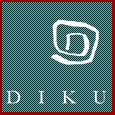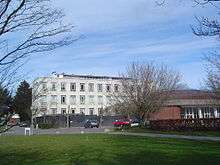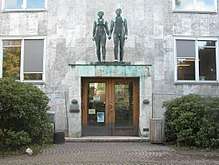UCPH Department of Computer Science

The UCPH Department of Computer Science (Danish: Datalogisk Institut, DIKU) is a department under the Faculty of Science at University of Copenhagen (UCPH). DIKU offers both undergraduate, graduate and Ph.D. programs. Students with a diploma equivalent of a Danish secondary school diploma are accepted for the undergraduate program, from where they can proceed with graduate studies and eventually Ph.D. studies.
History
DIKU was created in 1970 as a spin-out from the Institute for Mathematical Sciences. The first professor at DIKU was Peter Naur.[1]
Research groups
Research at the department is handled by a number of research groups, labs and centres. As of September 2010, the main groups are[2]
- The Image Group - image processing, physics based animation, robotics and artificial intelligence.
- Algorithmic and Programming Languages - optimization algorithms inspired by practical problems in bioinformatics, electronic chip design and logistics; and research on programming languages with a focus on automatic program optimization, analysis and transformation.
- Human‐centered computing - designs and implements systems, where human needs are in focus.
- Additional centres and laboratories - eScience Center, CITI - Center for IT Innovation, Performance Engineering Laboratory, Experience Lab.
Location


DIKU is based at University Park in Copenhagen, part of the university's North Campus. Its building complex comprises the former Department of Anatomy. The building was completed in 1942 to design by Kaj Gottlob.[3]
The Human-Centered Computing Group is located at both the university's South Campus on Amager as well as at the e-Science center in the Hans Christian Ørsted Institute, also at University Park.
Student life
An important social event is the DIKU revue which is held each year in June. The DIKU revue is always in competition with the physics revue and never misses an opportunity to computer-animate the complete and utter destruction of the physics institute at the H. C. Ørsted Institute.
As something unique among the institutes of Copenhagen University, the DIKU cantine is entirely student driven and open 24 hours. It is the natural hub for all social events on DIKU.
The two largest social events are the DIKU revue and the Julefrokost (Christmas lunch) of the cantine.
Miscellaneous
The domain diku.dk was registered on October 29, 1987, and was one of the first .dk domain names to be registered.[4]
The popular DikuMUD codebase was developed at DIKU in March 1990, and derives its name from the institute.[5]
In the 1994 Danish thriller Nattevagten (Nightwatch) directed by Ole Bornedal the main entrance and stairwell of the institute was used as a main location.
Famous DIKU researchers
- Per Brinch Hansen was a professor at the institute between 1984 and 1987.
- Peter Naur, A Turing Award recipient, was a professor at the institute between 1969 and 1998.
References
- ↑ Søndergaard, Ann Steendahl (2010-06-02). "Fra DIKUs historiebog - 1970erne" (in Danish). DIKU. Retrieved 7 January 2016.
- ↑ "Department of Computer Science, DIKU". Copenhagen University. Retrieved 2010-09-06.
- ↑ "Anatomisk Institutlanguage=Danish". Bygningskulturens Hus. Retrieved 29 August 2017.
- ↑ "Verdens første domænenavn fylder 30 i dag". Netsite. 15 March 2015. Retrieved 7 January 2016.
- ↑ Shah, Rawn; Romine, James (1995). Playing MUDs on the Internet. John Wiley & Sons, Inc. p. 22. ISBN 0-471-11633-5.
DikuMud first appeared in mid-March of 1990 when a group of programmers at the Department of Computer Science at the University of Copenhagen, Denmark got together and began work on a multiplayer game that is similar to but improved on AberMuds. These coders were Hans Henrik Stærfeldt, Katja Nyboe, Tom Madsen, Michael Seifert, and Sebastian Hammer.
External links
Coordinates: 55°42′07″N 12°33′40″E / 55.70194°N 12.56111°E